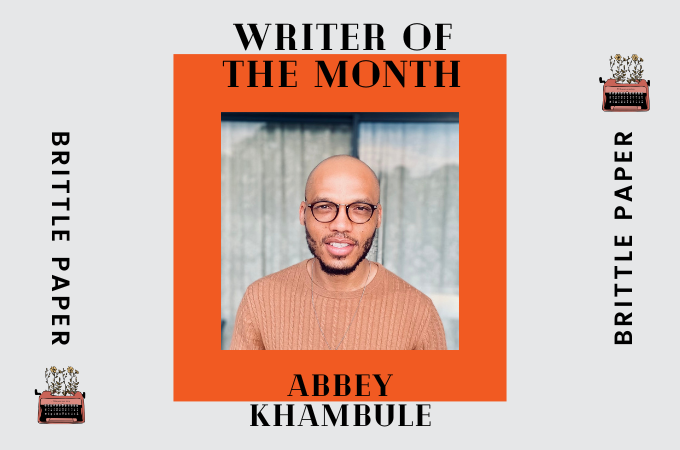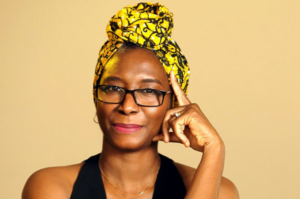
Brittle Paper’s Writer of the Month for January is Abbey Khambule!
You know him for his December story, “The Lord of the Sun”, but after this interview, you’ll know him as the wonderful up-and-coming South African writer. Born in Bela-Bela, or as locals call it Warmbaths, Abbey Khambule grew up in the ever-sunny North-West Province of South Africa. He then spent his adolescence in Pretoria with some summers in Mamelodi, where he learned about jazz and art. Abbey then moved again during his teenage years to Alexandra township where he attended high school and started art classes at the Johannesburg Art Gallery under the tutelage of Thea Soggot.
When his mother bought him a paperback copy of Alan Paton’s Cry, the Beloved Country, Abbey found himself in the core stages of his love affair with words. Needless to say, the book never left him, literally, as he took it wherever he went until its pages started falling out. But, having already left a mark on him, he started writing, and published his first short story in the iconic South African magazine, DRUM. Self-taught, his writing focuses on introspective narratives and mainly comprises of micro, flash fiction, and occasional micro-memoirs. But there is plenty more to delve into so let’s start the interview.
Brittle Paper
Abbey, congratulations on being January Writer of the Month! Your piece “The Lord of the Sun” was such an innocent and beautifully written approach to queerness. But before we jump into the story, let’s start at the beginning.
When did you start writing?
Abbey Khambule
Firstly, thank you so much for accepting my work and selecting me as January Writer of the Month. I couldn’t be more thrilled.
When did I start writing? Wow, where do I even begin? Writing for me came relatively late in my formative years as an adolescent. I’ve always loved stories and had somewhat toyed with the idea of storytelling, but art (painting and sculpting) had already taken most of my attention and was a sole passion in my childhood. I recall my first year in high school, my mom gave me Cry, the Beloved Country. The first novel I ever possessed, read, finished, and re-read. I started visiting local libraries in the different townships I stayed, and because we weren’t allowed to take out books, I’d sit there and read until someone said it was time to close. Soon after, I began experimenting with short story writing, then followed by poetry, which, to be honest, I first did to impress a girl.
Brittle Paper
“Cry, the beloved country, for the unborn child that is the inheritor of our fear.”
Cry, the Beloved Country is quite a powerful book to kickstart a love for novels. For those who are not familiar with the book, especially those who are not South African, would you recommend they go and read this book?
Abbey Khambule
I doubt my mom knew how special the book was when she stumbled on it, she wasn’t a reader. But to answer your question, I’d say with all the racial wars and injustices facing us today, I would recommend the book to the world. The story is a true work of beauty that taught me the spirit of compassion at a very young age. I carry that spirit today. It is a story about South Africa’s racial and tragic past. At the heart of it is a tale about compassion while facing pain and a growing divide. Set before apartheid South Africa, it follows the lives of two men—a Zulu priest in search of his son, and his neighbour, a white farmer who learns of his own son’s murder at the hands of the priest’s delinquent son. As both men learn about the tragedy, an unlikely relationship grows between them. Cry, the Beloved Country is as relevant today as it was seven decades ago.
Brittle Paper
Talking about great writing, let’s get into your December piece, “The Lord of the Sun”. How did you come up with this particular story?
Abbey Khambule
The story was simply inspired by a scene I witnessed earlier in the year while visiting family in Soweto. I arrived there in the evening while there was load-shedding and saw two young boys playing in the neighbour’s backyard, a little distance from the elders who were circling a small bonfire. One boy was twirling a stick lit at the end, and the other watched in awe. The scene reminded me of childhood, playing fire spinning in the night. It was a bit odd because I had never seen it done in the township before, and that’s when the idea came to me. I started jotting down words on my phone that I initially thought would be a poem, and I recall even having a title in mind, “Seven Thousand Colours of the Sun,” because I imagined the fire rings he spun as the sun [laughs] I returned to the jottings a few days later to retype it on my laptop, and that’s when the story itself was born. I decided to set it in a rural area under a queer theme, and the story quickly took the shape of its own.
Brittle Paper
My work helps me keep up to date on the wonderful growing library of queer African literature. But, while there are of course many queer works from our country, I still think queer stories based in the townships or rural spaces are underrepresented. What are your thoughts?
Abbey Khambule
I truly agree. Abhorrence, fear, and non-acceptance are still real in township and rural societies. Many writers and traditional storytellers, or knowledge keepers, steer strongly from queer subjects, but the literature grows, nonetheless.
Brittle Paper
Very true. The queer communities in rural SA areas have always existed and will always exist and it is about time that the shroud of silence is lifted for good.
I’ve read your other published works, such as “The Burning Fruit” and “Blue Hellebore”. What struck me most about your stories are the references to nature, especially the role of the sun, when discussing the different characters’ pain and healing. Is nature a big inspiration to you?
Abbey Khambule
I’m pleased you picked up on that in my other works. Yes, nature features quite frequently in my writing. I find inspiration in it, and I believe it’s drawn from my art background—the natural world themes were central to most of my art pieces. I grew up in the rural North-West where when boys got hungry in the day, they’d go hunt birds in the veld with makeshift ketties (slingshots), pick fruits, or go fishing by the nearby river. We literally lived off the land. And young as we were, I think we understood very early on that everything was connected, including the sun, the stars, and the moons in our solar system, which to some, were merely objects in the sky.
Brittle Paper
Well, if you are inspired by the nature around you, I am sure SA will inspire plenty more. It’s why the Eastern Cape birthed so many great writers.
When I was going through your portfolio on your website, I saw that your published work took a bit of a break between 2020-22. Was this a creative break? I only ask because, besides the obvious, the pandemic also took a lot out of creatives’ ability to produce during this time. Did you find this period contributing quite heavily to your writer’s block?
Abbey Khambule
Yes, the period of the pandemic was key in that break. There’s quite a lot I’ve lost, as did many of our people during that time – loved ones, a home, and an income. In it were moments of hopelessness when I couldn’t write anything worth sharing. Curative as writing may be for me, I found the time very difficult. But I’m generally an optimistic person and so I found courage in whatever little I wrote. I might possibly share those one day.
Brittle Paper
If and when you find the strength to share it someday, I look forward to reading it.
We will get to read a new piece from you on Friday. Is this going to follow suit with the themes of healing and nature?
Abbey Khambule
Every piece I write is personal. As you might have learned, my work is often self-examining, the method some readers may find to be a little bleak, and so I find flash and micros quite useful and inviting in getting my stories heard. I apply the art of compression to my work, allowing me to say a lot in just a few, carefully constructed words while also adding a bit of intrigue. “A Houseful of Bad Seeds” is one such story, and without spoiling it, this is a story about a little boy looking to restore (or redeem) himself in his disapproving grandmother’s eyes.
Brittle Paper
I’m sure our readers will agree when I say we cannot wait for Friday.
Before we go, apart from your writing, Abbey, what is one thing about yourself that you want to share with our readers?
Abbey Khambule
Anything? [laughs] I can’t think of much besides that what most people don’t know, unless it’s crawling down my arms under short sleeve shirts, is that I carry lots of ink. I have tattoos holding little stories and symbols of where I’ve been and where I’d like to be.
Brittle Paper
Abbey, it has been such a pleasure chatting to you. Thank you for sharing your time and work with us, and a big thank you for kickstarting another year of our Writer of the Month interviews.
I hope this new year brings plenty of inspiration and tons of acceptance letters for you and all of our writers!
For more of Abbey’s work, be sure to check back in on Friday, and for more interviews with our writers, check out our last month’s with Fowota Mortoo here.








COMMENTS -
Reader Interactions